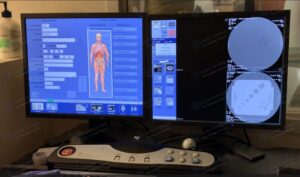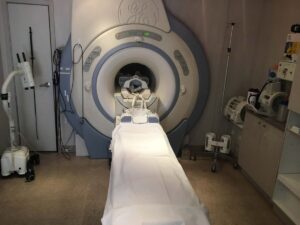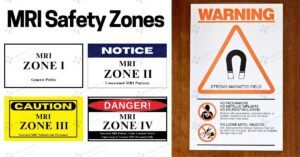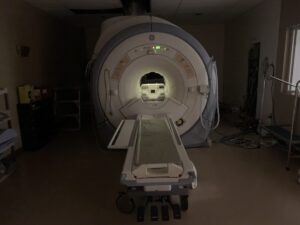In this article, we delve into the world of MRI health risks, aiming to separate fact from fiction. MRI has revolutionized diagnostic imaging however, there are many misconceptions surrounding MRI safety.
MRI Health Risks Explained
By examining the evidence and addressing common misconceptions, we aim to provide a clear understanding of the actual risks associated with MRI, empowering you to make informed decisions about your health.
Magnetic Resonance Imaging (MRI) is a commonly used medical imaging technology that uses a strong magnetic field, radio waves, and a computer to produce detailed images of the body’s internal structures. MRI is a non-invasive and generally safe procedure, but some patients may wonder if it can make them sick. Here are some factors to consider.
Can an MRI Make You Sick?
The magnetic field utilized in an MRI is undeniably powerful. Failure to observe specific precautions can result in potential discomfort or even injury. Patients who have metal objects in their bodies, such as pacemakers or metal implants, may be at risk of injury or discomfort during an MRI.
In addition, patients who have tattoos or piercings with metal objects may also experience discomfort or even burning sensations during the procedure. For these reasons, it is important to inform your doctor and the MRI technician of any metal objects in your body before the procedure.
Generally, experts recommend keeping all metal items outside the MRI scan room to minimize safety risks.
Can MRI Contrast Make You Sick?
The contrast agent used in MRI with contrast may cause some side effects in some patients. The contrast agent used in MRI typically consists of a gadolinium-based compound, which experts generally consider safe.
However, some patients may experience allergic reactions or side effects such as headaches, nausea, or dizziness. If you have a history of allergies or other medical conditions, it is important to inform your doctor before the procedure.
Is MRI Claustrophobic?
MRI machines are large, tunnel-like devices that can be intimidating to some patients. Some patients may experience claustrophobia or anxiety during an MRI. If you are prone to anxiety or claustrophobia, it is important to inform your doctor before the procedure. In some cases, sedatives or anti-anxiety medications may be prescribed to help you relax during the procedure.
Is MRI safer than CT scan?
When it comes to safety, MRI is generally considered safer than CT scans. MRI uses a magnetic field and radio waves instead of ionizing radiation, making it a safer option, especially for repeated or prolonged examinations. MRI also provides clearer images of soft tissues and organs compared to CT scans. However, the choice between the two depends on individual medical needs and should be discussed with a healthcare provider. You can find more details in the MRI vs CT scan article.
Related: MRI Safety Zones and MRI Safety Accidents Case Study
Fatigue During MRI
Finally, some patients may experience fatigue or discomfort from lying still for an extended period of time. The duration of MRI scans varies depending on the type of scan being performed, with an average range of 20 minutes to an hour. In addition, the loud noises produced by the MRI machine can be disruptive or uncomfortable for some patients.
Conclusion
In conclusion, MRI is generally a safe and non-invasive medical imaging technology. However, some patients may experience discomfort or side effects, during or after the procedure.
It is important to inform your doctor and the MRI technician of any medical conditions or metal objects in your body before the procedure. If you experience any discomfort or side effects during the procedure, it is important to inform the technician immediately.
With proper preparation and communication, an MRI can be a safe and effective way to diagnose and monitor a wide range of medical conditions.
Related Resources
- MRI Scan Sounds Explained
- Top 10 Tips to Stay Calm During MRI Scans
- Guide To Breast MRI Scan
- Guide To Lumbar MRI Scan
- MRIPETCTSOURCE YouTube Channel
Join the Medical Imaging Source Community!
Subscribe To Our Newsletter To Stay Up To Date With The Latest News, Exclusive Offers, And Giveaways!
The information provided by MRIPETCTSOURCE (“we,” “us,” or “our”) on https://www.medicalimagingsource.com (the “Site”) is for general informational purposes only. All information on the Site is provided in good faith, however we make no representation or warranty of any kind, express or implied, regarding the accuracy, adequacy, validity, reliability, availability, or completeness of any information on the Site. UNDER NO CIRCUMSTANCE SHALL WE HAVE ANY LABILITY TO YOU FOR ANY LOSS OR DAMAGE OF ANY KIND INCURRED AS A RESULT OF THE USE OF THE SITE OR RELIANCE ON ANY INFORMATION PROVIDED ON THE SITE. YOUR USE OF THE SITE AND YOUR RELIANCE ON ANY INFORMATION ON THE SITE IS SOLELY AT YOUR OWN RISK.





